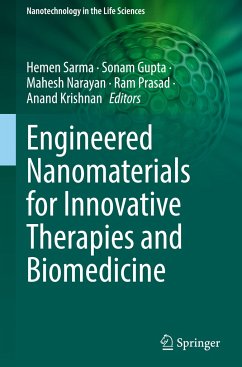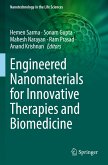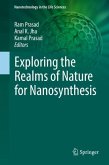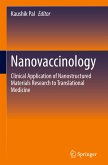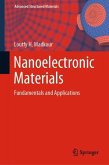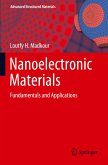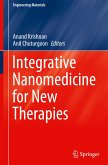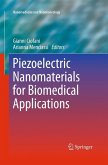Engineered Nanomaterials for Innovative Therapies and Biomedicine
Herausgegeben:Sarma, Hemen; Gupta, Sonam; Narayan, Mahesh; Prasad, Ram; Krishnan, Anand
Engineered Nanomaterials for Innovative Therapies and Biomedicine
Herausgegeben:Sarma, Hemen; Gupta, Sonam; Narayan, Mahesh; Prasad, Ram; Krishnan, Anand
- Gebundenes Buch
- Merkliste
- Auf die Merkliste
- Bewerten Bewerten
- Teilen
- Produkt teilen
- Produkterinnerung
- Produkterinnerung
Research on biomedical applications of nanomaterials has exhibited the rapidly evolving field of biomedical sciences by showing how effective they are in treatment. These particles hold considerable potential for biomedical applications. Work is ongoing, and the results suggest a possibility for a sustainable future for nanomaterials in both therapeutic and biomedical fields. This book highlights current and emerging applications, taking global research findings into consideration. We believe the focus on the identification and role of nanomaterial applications in therapeutic and biomedical…mehr
Andere Kunden interessierten sich auch für
![Engineered Nanomaterials for Innovative Therapies and Biomedicine Engineered Nanomaterials for Innovative Therapies and Biomedicine]() Engineered Nanomaterials for Innovative Therapies and Biomedicine119,99 €
Engineered Nanomaterials for Innovative Therapies and Biomedicine119,99 €![Exploring the Realms of Nature for Nanosynthesis Exploring the Realms of Nature for Nanosynthesis]() Exploring the Realms of Nature for Nanosynthesis75,99 €
Exploring the Realms of Nature for Nanosynthesis75,99 €![Nanovaccinology Nanovaccinology]() Nanovaccinology127,99 €
Nanovaccinology127,99 €![Nanoelectronic Materials Nanoelectronic Materials]() Loutfy H. MadkourNanoelectronic Materials172,99 €
Loutfy H. MadkourNanoelectronic Materials172,99 €![Nanoelectronic Materials Nanoelectronic Materials]() Loutfy H. MadkourNanoelectronic Materials171,99 €
Loutfy H. MadkourNanoelectronic Materials171,99 €![Integrative Nanomedicine for New Therapies Integrative Nanomedicine for New Therapies]() Integrative Nanomedicine for New Therapies97,99 €
Integrative Nanomedicine for New Therapies97,99 €![Piezoelectric Nanomaterials for Biomedical Applications Piezoelectric Nanomaterials for Biomedical Applications]() Piezoelectric Nanomaterials for Biomedical Applications75,99 €
Piezoelectric Nanomaterials for Biomedical Applications75,99 €-
-
-
Research on biomedical applications of nanomaterials has exhibited the rapidly evolving field of biomedical sciences by showing how effective they are in treatment. These particles hold considerable potential for biomedical applications. Work is ongoing, and the results suggest a possibility for a sustainable future for nanomaterials in both therapeutic and biomedical fields.
This book highlights current and emerging applications, taking global research findings into consideration. We believe the focus on the identification and role of nanomaterial applications in therapeutic and biomedical sciences can lead to novel solutions in the fields. The chapters of this book are disseminated in a manner that can be readily adopted as sources for new and further study. The editors integrate advanced texts in their research that help graduate students, researchers and professors. Additionally, we believe that international readers will be able to make use of this book for reference purposes.
This book highlights current and emerging applications, taking global research findings into consideration. We believe the focus on the identification and role of nanomaterial applications in therapeutic and biomedical sciences can lead to novel solutions in the fields. The chapters of this book are disseminated in a manner that can be readily adopted as sources for new and further study. The editors integrate advanced texts in their research that help graduate students, researchers and professors. Additionally, we believe that international readers will be able to make use of this book for reference purposes.
Produktdetails
- Produktdetails
- Nanotechnology in the Life Sciences
- Verlag: Springer / Springer International Publishing / Springer, Berlin
- Artikelnr. des Verlages: 978-3-030-82917-9
- 1st edition 2022
- Seitenzahl: 468
- Erscheinungstermin: 22. Februar 2022
- Englisch
- Abmessung: 241mm x 160mm x 31mm
- Gewicht: 863g
- ISBN-13: 9783030829179
- ISBN-10: 3030829170
- Artikelnr.: 62148268
- Herstellerkennzeichnung Die Herstellerinformationen sind derzeit nicht verfügbar.
- Nanotechnology in the Life Sciences
- Verlag: Springer / Springer International Publishing / Springer, Berlin
- Artikelnr. des Verlages: 978-3-030-82917-9
- 1st edition 2022
- Seitenzahl: 468
- Erscheinungstermin: 22. Februar 2022
- Englisch
- Abmessung: 241mm x 160mm x 31mm
- Gewicht: 863g
- ISBN-13: 9783030829179
- ISBN-10: 3030829170
- Artikelnr.: 62148268
- Herstellerkennzeichnung Die Herstellerinformationen sind derzeit nicht verfügbar.
Hemen Sarma obtained his Ph.D. in Botany from Gauhati University [2008] and pursued postdoctoral studies at North East Hill University, Shillong [2009-10] and the Institute of Advanced Studies in Science and Technology [IASST], Guwahati [2011-12], India. He is currently senior Assistant Professor at N N Saikia College, affiliated with Dibrugarh University, Assam, India [Since 2012]. His research focus is on plant- microbiome interactions, biosurfactants, persistent organic and inorganic pollutants, sustainable remediation, molecular breeding, CRISPR/cas9 gene editing and nanobiotechnology. Important contributions were made to the bioremediation of emerging contaminants [ECs], endocrine disrupting compounds (EDCs) and persistent organic pollutants (POPs). Dr. Sarma has more than 50 publications to his name in peer-reviewed international journals, including conference papers and book chapters, and patents that have been published or are pending. He is the author of five books by leading international publishers John Wiley and Sons, UK and Springer Nature, USA and Elsevier USA. Dr. Sarma has contributed to the peer review process of several high-impact journals [ACS, Elsevier, Springer]. He is a review editor of Frontiers in Microbiology and the series editor of Advances in Biotechnology and Bioengineering' Elsevier INC, Cambridge, MA 02139. Dr. Sarma has 10 years of teaching experience, completed 04 research projects sponsored by the Department of Biotechnology, the Government of India and the University Grants Commission, New Delhi. He has received several awards, distinctions and fellowships, such as DBT-Overseas Associateship [2015-16] and DBT-Research Associateship [2011-12], IISc Research Associateship [2009] and UGC-Dr. DS Kothari Postdoctoral Fellowship Awards [2009-10]. In 2017-18, Dr. Sarma joined as an Affiliate in the Department of Chemistry and Biochemistry, University of Texas, El Paso, USA, in a Visitor Professor Fellowship Program. He has received a foreign travel fellowship and has visited many reputed universities for academic purpose. Cairo University, Giza, Egypt in 2011, University of Western Australia, Perth, 2016, and Hamburg University, Germany in 2016, and University of Texas at El Paso, 2017-18. Dr. Sonam Gupta obtained her Ph.D. from Department of Biotechnology, IIT Roorkee in 2019. Currently, she is working as a lecturer at the Department of Biotechnology, NIT Raipur, India from the past two years. She has got merit first rank in her masters and awarded with gold medal from Guru Ghasidas Vishwavidyalaya Bilaspur, Chhattisgarh. She availed GATE 2012 and prestigious DST-INSPIRE fellowship for pursuing PhD. During her PhD tenure, she worked on the biomedical applications of a surface-active glycolipid in terms of anticancer, antibiofilm, wound healing and antiulcer activities. She has developed skills on different molecular biology and microbiology techniques such as Fluorescence microscopy and Reverse-transcription polymerase chain reaction, microbroth dilution assay, surface-tension reducing assay, XTT assay, DNA/RNA isolation, cDNA synthesis and animal handlings for in vivo experiments. She has also awarded with "Young Appreciation Award" with One Lakh Rupee grant by SRISTI-BIRAC, Ahmedabad for grassroot innovative practice. Her research interests include biomedical applications of biosurfactants, studies on Candida biofilm, quorum sensing, and nanomaterials and her work was published in reputed journals. Dr. Mahesh Narayan is a Full professor in the Department of Chemistry and Biochemistry at the University of Texas at El Paso in the United States. Dr Narayan obtained his B.Sc. in Physics from Bombay University [1991], Ph.D. in Biophysics from The Ohio State University [1997], and pursued postdoctoral studies at Cornell University, USA [1997-2000] and was a Sr. Res. Assoc. at Cornell University] [2002-05], USA. He has authored and co-authored over 85 research and review articles [Scopus] and book chapters in the fields of free radical biology, protein-structure function, oxidative folding, and protein misfolding, halogen bonding and in silico drug design, agricultural impact of nanomaterials, and chemical education. His work has been recognized by invitations to speak at over 15 international forums, as well as coverage in a variety of media outlets. The overall goal of his research program is to develop a better understanding of the intracellular processes and events that underlying the pathogenesis of neurodegenerative disorders. He is particularly interested in the effects of xenobiotics on amyloid proteins. This is since the majority of neurodegenerative disorders are sporadic, and environmental agents such as pesticides and certain drugs of abuse are risk factors for such neuropathies. He has investigated the ability of natural products and, more recently, Carbon Nano Materials (CNMs) to alleviate toxicant-induced loss of neuronal homeostasis and amyloid protein aggregation. He currently serves on the Editorial Boards of PLOS One (Public Library of Science), Cell Biochemistry and Biophysics (Springer) and The Protein Journal (Springer). Ram Prasad, Ph.D. is associated with Department of Botany, Mahatma Gandhi Central University, Motihari, Bihar, India. His research interest includes applied & environmental microbiology, plant-microbe-interactions, sustainable agriculture and nanobiotechnology. Dr. Prasad has more than one hundred seventy-five publications to his credit, including research papers, review articles & book chapters and five patents issued or pending, and edited or authored several books. Dr. Prasad has twelve years of teaching experience and has been awarded the Young Scientist Award & Prof. J.S. Datta Munshi Gold Medal by the International Society for Ecological Communications; FSAB fellowship by the Society for Applied Biotechnology; the American Cancer Society UICC International Fellowship for Beginning Investigators, USA; Outstanding Scientist Award in the field of Microbiology by Venus International Foundation; BRICPL Science Investigator Award and Research Excellence Award etc. He has been serving as editorial board members: Frontiers in Microbiology, Frontiers in Nutrition, Archives of Phytopathology and Plant Protection, Phyton- International Journal of Experimental Botany; Academia Journal of Biotechnology, Journal of Renewable Materials, IET Nanobiotechnology, Biocell; including Series editor of Nanotechnology in the Life Sciences, Springer Nature, USA. Previously, Dr. Prasad served as Assistant Professor Amity University Uttar Pradesh, India, Visiting Assistant Professor, Whiting School of Engineering, Department of Mechanical Engineering at Johns Hopkins University, Baltimore, United States and Research Associate Professor at School of Environmental Science and Engineering, Sun Yat-sen University, Guangzhou, China. Dr. Anand Krishnan, PrChemSA, MRSC, has expertise in organic chemistry/medical biochemistry/ integrative medicine/nano(bio)technology/drug discovery. He received his doctoral degree in organic chemistry in the Department of Chemistry, Durban University of Technology, in collaboration with the Department of Medical Biochemistry, University of KwaZulu-Natal, in 2014. He completed his master's degree in organic chemistry from Bharathiar University, India, and bachelor's degree in chemistry from Madurai Kamaraj University, India. He was Postdoctoral Researcher at Durban University of Technology, South Africa, from November 2014 to November 2016. Later, He worked as a Senior Researcher at Discipline of Medical Biochemistry and Chemical Pathology, School of Laboratory Medicine and Medical Sciences, University of KwaZulu-Natal, Durban, South Africa from January 2017 to June 2019. Recently, he received prestigious Innovation Postdoctoral Research Fellowship from the Departmentof Science and Innovation (DSI) and the National Research Foundation (NRF), South Africa and conducting research at the Department of Chemical Pathology, School of Pathology, Faculty of Health Sciences and National Health Laboratory Service (NHLS), University of the Free State, Bloemfontein, South Africa. He has published many scientific articles in international peer-reviewed journals and has authored many chapters as well as review articles. He was recognized for his contributions and received awards from national and international organizations. He has been awarded Best Postdoctoral Researcher Award for 2016 and 2017 from Durban University of Technology and Young Scientist Researcher Award 2016 from Pearl Foundation. He is Member of various editorial boards of the journals of the international reputation. His research interests include organic chemistry, heterocyclic chemistry, medicinal biochemistry, drug discovery and delivery, extracellular vesicles, nanotoxicology, clinical biochemistry and chemical pathology. Recently, He has evaluated by the National Research Foundation and awarded a Y1 rating which is given to promising young researchers.
Preface.- Engineered Nanomaterials for a Sustainable Future.- Advances in Nanomedicine Development for Head and Neck Cancer Therapy.- Nanoparticles Towards Advanced Cancer Therapeutics.- Quantum Dots and Progress in the Diagnosis and Treatment of Cancer.- Nanomaterial-Based Diagnosis of Prostate Cancer.- Nanomaterials for Treatment for Psoriasis vulgaris.- Nanomaterials for the Treatment of Neurodegenerative Diseases.- Nanomaterial Research Involving Neural Stem Cells and Tissue Engineering.- Metal Nanoparticles for Dermatology and Cosmetics.- Quantum Dots.- Development of Nanomaterials Based on Graphene for Biomedical Purposes.- Nanomaterials in Vaccines and Immunology.- Mesophorous Silica Nanomaterials Enhances Adhesion for Enduring Bacterial Inhibition.- Personalized Nanomedicine.- Nanotherapeutic Approach to Obesity Treatment.- Fluorescent Silicone Nanomaterials.- Nanomaterial-Based Electrochemical Screening Techniques for Endocrine-Disrupting Chemicals.- Polymersomes.- Development in Nanotechnology in the Manufacturing of Dental Materials.- Biomedical and Antioxidative Nanomaterials.- Emerging 2D Material-Based Bioelectronics and Biosensors.- Advances in Natural Polymer-Based Electrospun Nanomaterials for Soft Tissue Engineering.- Nano-Forensics.- Bibliography.- Index.
Preface.- Engineered Nanomaterials for a Sustainable Future.- Advances in Nanomedicine Development for Head and Neck Cancer Therapy.- Nanoparticles Towards Advanced Cancer Therapeutics.- Quantum Dots and Progress in the Diagnosis and Treatment of Cancer.- Nanomaterial-Based Diagnosis of Prostate Cancer.- Nanomaterials for Treatment for Psoriasis vulgaris.- Nanomaterials for the Treatment of Neurodegenerative Diseases.- Nanomaterial Research Involving Neural Stem Cells and Tissue Engineering.- Metal Nanoparticles for Dermatology and Cosmetics.- Quantum Dots.- Development of Nanomaterials Based on Graphene for Biomedical Purposes.- Nanomaterials in Vaccines and Immunology.- Mesophorous Silica Nanomaterials Enhances Adhesion for Enduring Bacterial Inhibition.- Personalized Nanomedicine.- Nanotherapeutic Approach to Obesity Treatment.- Fluorescent Silicone Nanomaterials.- Nanomaterial-Based Electrochemical Screening Techniques for Endocrine-Disrupting Chemicals.- Polymersomes.- Development in Nanotechnology in the Manufacturing of Dental Materials.- Biomedical and Antioxidative Nanomaterials.- Emerging 2D Material-Based Bioelectronics and Biosensors.- Advances in Natural Polymer-Based Electrospun Nanomaterials for Soft Tissue Engineering.- Nano-Forensics.- Bibliography.- Index.

